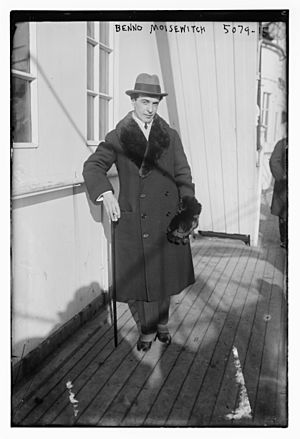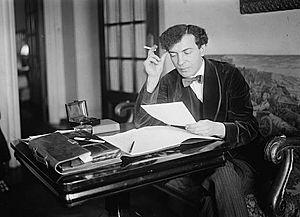Benno Moiseiwitsch facts for kids
Quick facts for kids
Benno Moiseiwitsch
|
|
|---|---|

Moiseiwitsch in 1920
|
|
| Born | 22 February 1890 |
| Died | April 9, 1963 (aged 73) |
| Occupation | Pianist |
Benno Moiseiwitsch was a very talented British pianist who was born in Ukraine. He lived from 1890 to 1963. He became famous for his amazing piano playing, especially his interpretations of Romantic music. He performed for many people around the world and was even honored by the British King for his help during World War II.
Contents
About Benno Moiseiwitsch
Benno Moiseiwitsch was born in Odessa, which was part of the Russian Empire at the time, but is now in Ukraine. This was on February 22, 1890. He started learning piano when he was just seven years old. He was so good that he won a special prize, the Anton Rubinstein Prize, when he was only nine!
From 1904 to 1908, he studied with a famous teacher named Theodor Leschetizky in Vienna. After his studies, he moved to England with his family. He played his first concert in England in 1908 and his first in London the next year.
Benno Moiseiwitsch became a very busy musician. He traveled all over the world to perform. He toured places like the United States, Australia, India, Japan, and South America. In 1937, he officially became a British citizen.
His Contributions During Wartime
During the Second World War, Benno Moiseiwitsch did a lot to help. He performed hundreds of concerts for soldiers and for charities. Because of his efforts, he was given a special award in 1946. He was made a Commander of the Order of the British Empire (CBE). This is a very important award in Britain.
His Family and Friends
Benno Moiseiwitsch married an Australian concert violinist named Daisy Kennedy. They had two daughters, Sandra and Tanya Moiseiwitsch, who became a well-known set designer. Later, he married Anita, and they had a son named Boris.
He was good friends with the composer Nikolai Medtner. Benno even asked Medtner to write his Piano Concerto No. 3, which is also known as "Ballade." Besides music, Benno had another interesting hobby: he was a skilled wrestler! He even had friendly wrestling matches with a music critic who also loved wrestling.
His Unique Piano Style
Benno Moiseiwitsch was especially known for how he played music from the late Romantic period. This included pieces by composers like Sergei Rachmaninoff and Robert Schumann. Rachmaninoff admired Benno's playing a lot and even called him his "spiritual heir." Benno himself said that Schumann's piano music gave him the most "emotional and spiritual satisfaction."
When he played the piano, Benno Moiseiwitsch was known for his elegant and poetic style. He had beautiful phrasing, brilliant technique, and a relaxed way of playing. He also had a lot of freedom in his rhythm.
He made many recordings throughout his career. You can hear his special style in his recordings of Rachmaninoff's Rhapsody on a Theme of Paganini. He also recorded pieces by Frédéric Chopin, like the Barcarolle and Ballade No. 4. A music critic once said that Benno's playing of Chopin's Ballade in F minor showed his amazing sensitivity.
Benno also enjoyed playing chamber music with other musicians. This means playing in small groups, like in Rachmaninoff's Trio Élégiaque. Another critic, Harold C. Schonberg, praised Benno's strong technique and his free approach to music. He noted that this freedom was always balanced with excellent musicality.
His Recordings and Films
Benno Moiseiwitsch made many recordings during his life. While there isn't one complete list of all his recordings, many of them are available today on CDs. Different companies have released his recordings, and they might sound a bit different depending on how they were restored.
He also appeared in some films. For example, you can see him playing a piece by Wagner-Liszt in a DVD about the pianist Georges Cziffra. He also appeared in a film called "The Art of Piano: Great Pianists of the 20th Century." In this film, he plays an excerpt from Rachmaninoff's Piano Concerto No. 2 and talks about a conversation he had with Rachmaninoff.
See also
 In Spanish: Benno Moiseiwitsch para niños
In Spanish: Benno Moiseiwitsch para niños
 | Chris Smalls |
 | Fred Hampton |
 | Ralph Abernathy |


